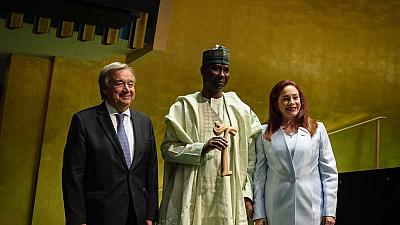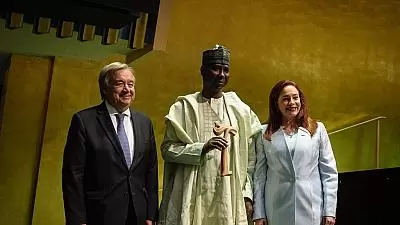

Last updated on September 11th, 2021 at 03:23 pm
Every year in September, all 193 members of the United Nations meet at the General Assembly at the organisation’s headquarters in New York.
The General Assembly is one of the six main organs of the UN, where several international issues covered by the Charter of the United Nations, such as development, peace and security, international law are discussed.
This year’s assembly which starts on September 17, has climate change, universal health coverage and the politics of sustainable development, on the agenda.
There will also be meetings on financing for development, elimination of nuclear weapons and the Sustainable Development Goals (SDGs).
Ghana will occupy the first seat in the Hall for this year’s session, including in the main committees, followed by all the other countries, in English alphabetical order.
Nigerian elected president
Nigeria’s permanent representative to the United Nations, Ambassador Tijjani Muhammad-Bande, was this week elected president of the 74th General Assembly.
The United Nations Secretary-General António Guterres commended the Nigerian scholar and diplomat for prioritising peace and security, poverty eradication, zero hunger, quality education, climate action and inclusion, all of which the UN chief called “central to the sustainable development agenda”.
‘‘He also brings valuable insights into some of the pressing peace and security, human rights and sustainable development challenges facing this body, from the spread of violent extremism to the threat of the global climate crisis,’‘ Guterres said.
‘‘I also applaud your emphasis on human rights and gender parity,’‘ he added.
In his inaugural address as General Assembly President, Prof. Muhammad-Bande said he would “collaborate and coordinate” with the Security Council, and the Secretariat “to ensure that greater attention is paid to prevention rather than reaction to full blown conflict.”
‘‘I will also advocate for effective early detection and warning systems, as well as mediation, negotiation and peaceful settlement of ongoing conflicts,’‘ he promised.
‘‘The recent emergencies in the Bahamas, Mozambique, and the Sahel region, among others, reminds us of the urgency of strengthening global action to tackle climate change,’‘ he argued.
US Secretary of State Marco Rubio ordered South African Ambassador Ebrahim Rasool to leave America by March 21 because he…
Early 2025 ends with IPL fever in India and cricket fans receive good news of an international schedule full of…
National teams from Africa advance their World Cup qualification pursuit as they take part in Matchday 5 of the qualifiers.…
Creative Africa Nexus (CANEX) is running the Book Factory Prize for Publishing in Africa again to award $28,000 to African…
Canadian companies have expanded their presence as major African mining stakeholders and invested more than $37 billion. Africa holds the…
The South African government wants people to plant one million trees across the nation within a single day on September…
This website uses cookies.